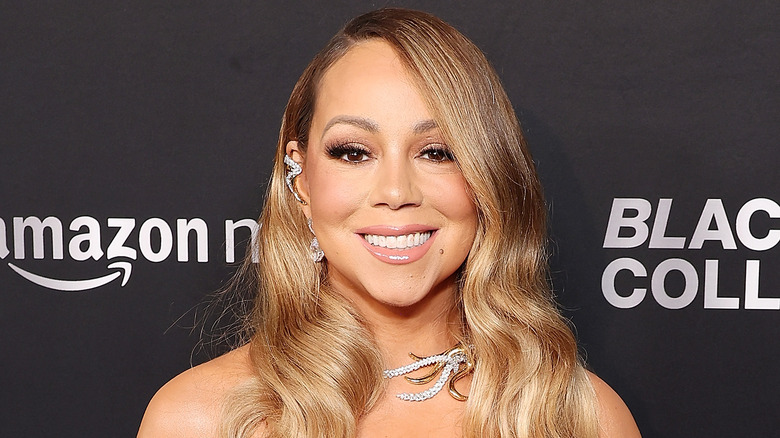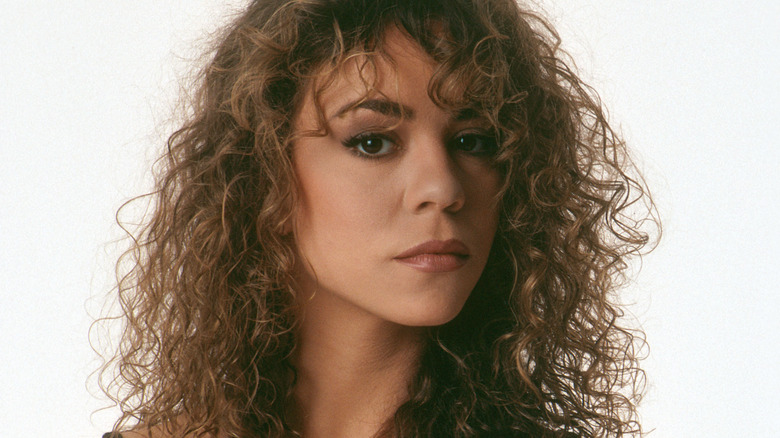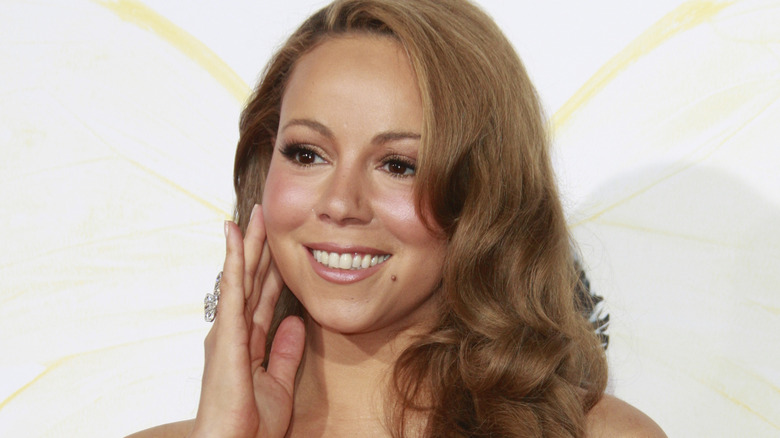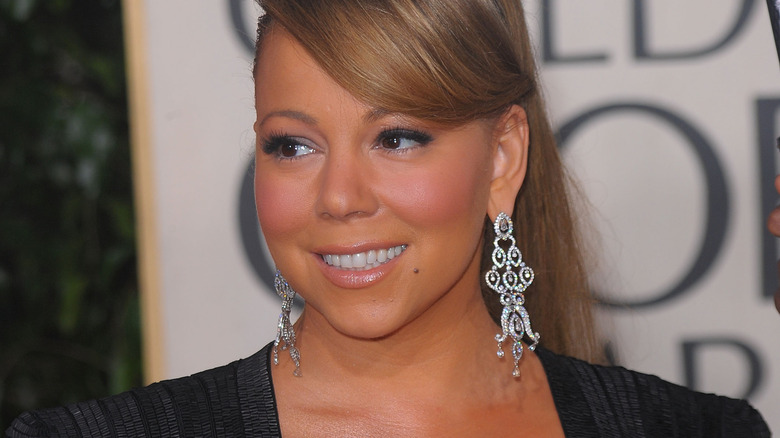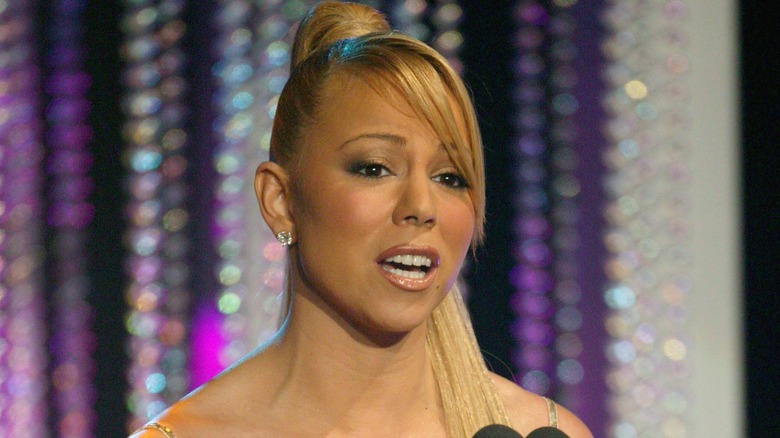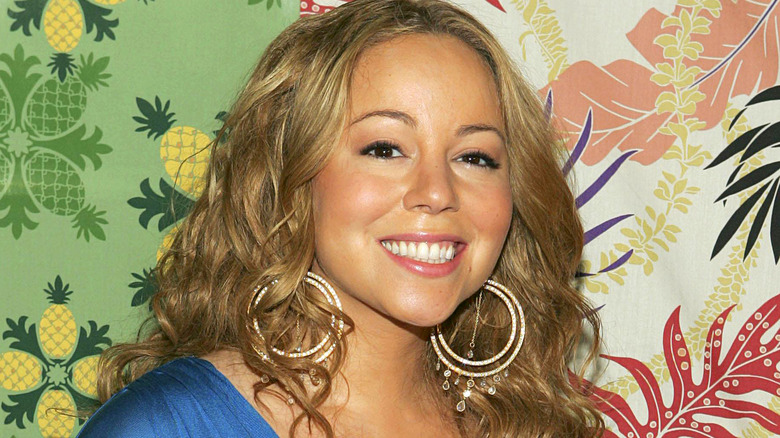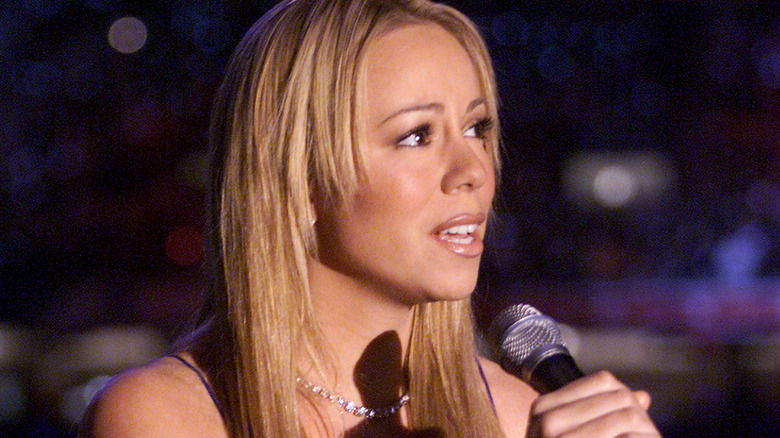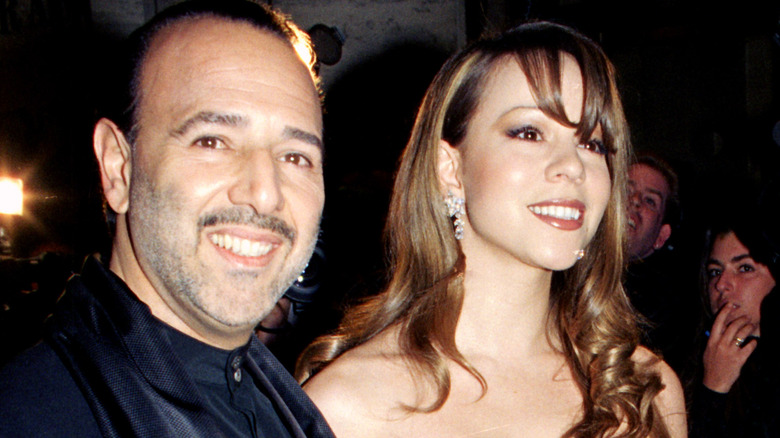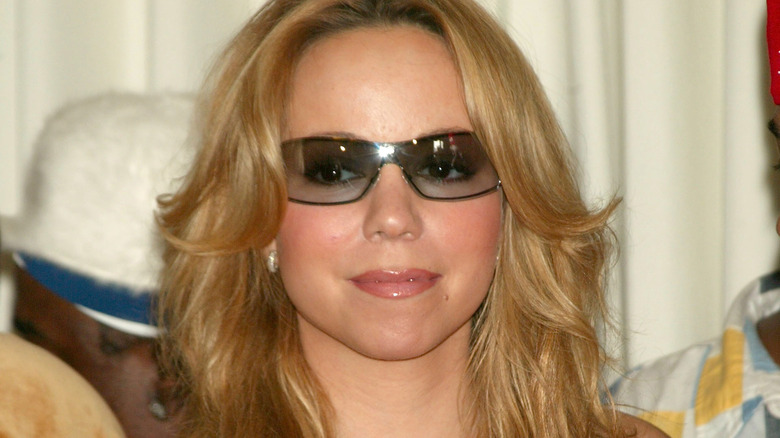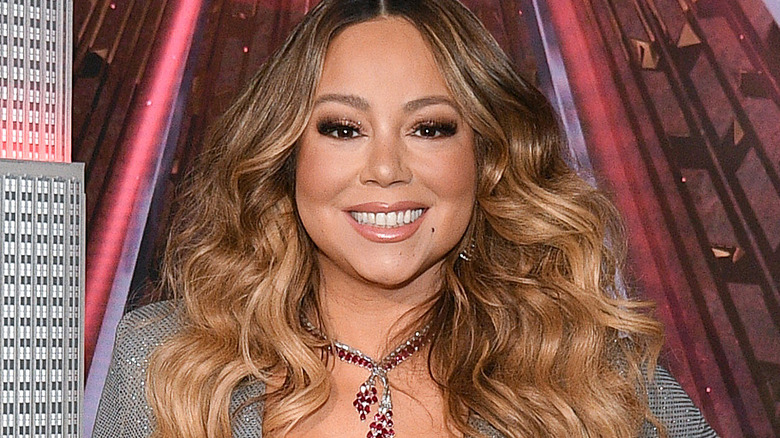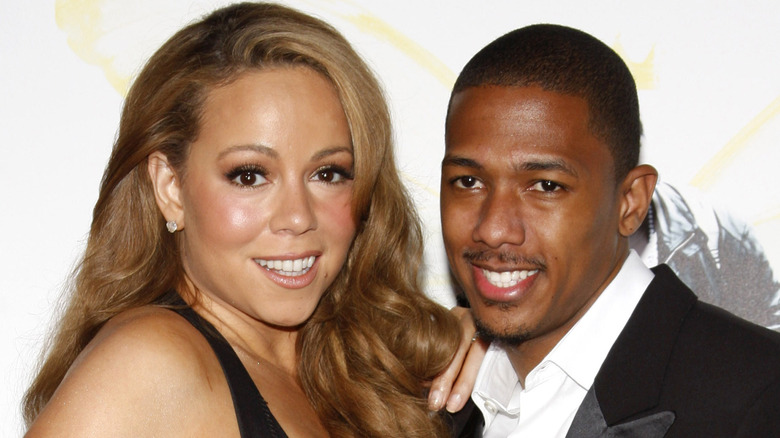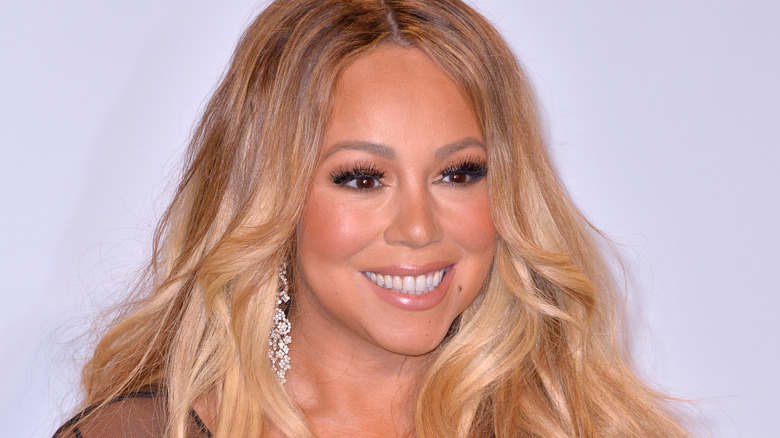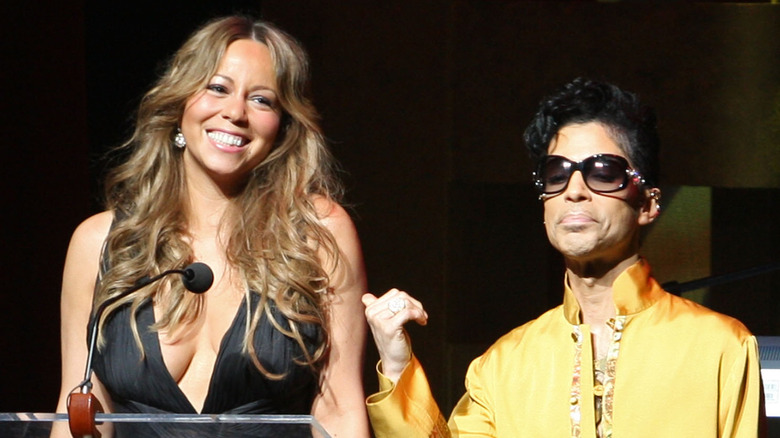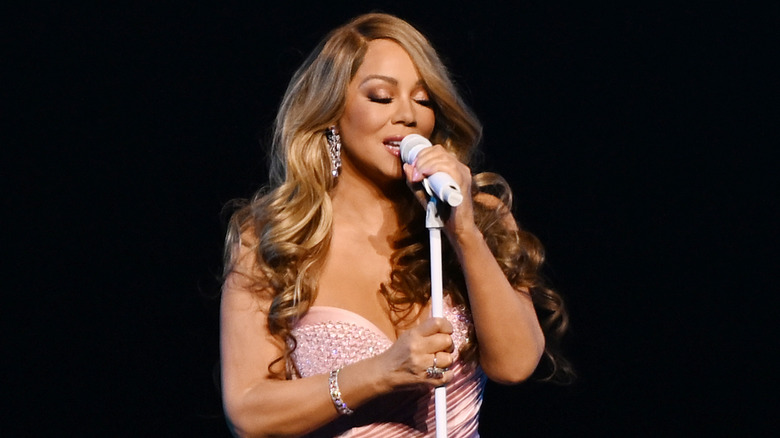Tragic Details About Mariah Carey
The following article contains references to racism, mental health issues, sexual misconduct, and domestic abuse allegations.
Ever since Mariah Carey hit the airwaves with her vision of love, fans' love for her has been unwavering. Considering her apparent agelessness, it's hard to believe it was over 30 years ago when Carey first shone in the spotlight with her brand of radio-friendly, R&B-infused pop. Her hit singles, including that of the festive variety, have invariably painted a picture of an ebullient star with the world at her feet. But not all's fair in love and warbling: Carey has overcome major obstacles and harrowing personal turmoil to become the confident, effervescent woman she is today.
It's perhaps rather telling that Carey's greatest idol has always been Marilyn Monroe. As the controversial "Blonde" biopic reaches our screens, there's been renewed analysis into the relentless abuse and degradation inflicted upon the Hollywood starlet. And it's apparent that there are myriad parallels between the two legends' lives. Like Monroe, Carey felt unloved as a child; thrust into the limelight as young women, both Carey and Monroe were subjected to the advances of predatory men, and the two women made strides to transcend the fallacious depictions of themselves in the media (in Carey's case, she has been routinely reduced to being a troublesome diva).
Although bullies made the beauty feel like an ugly duckling, Carey became the songbird supreme. And while she has risen above the multiple tragedies that blighted her life, it was a rocky road to finding her peace. Get the hankies ready for tragic details about Mariah Carey.
Mariah Carey was subjected to racist abuse
As the child of a white mother, Patricia Carey, and Black father, Alfred Carey, Mariah Carey sadly faced the wrath of racists when growing up. In an interview with Oprah Winfrey, Patricia revealed that her mother was disappointed when she announced her engagement to a Black man and ultimately disowned her when she married him. The Careys also faced racial prejudice from their neighbors, some of whom allegedly poisoned the family dog and even shot through their windows.
But it wasn't until a 6-year-old Mariah brought a friend round to her father's house that she realized she looked different to the other children in her predominantly white neighborhood. Explaining that she didn't believe her friend had ever seen a Black man before, Mariah told The Guardian that her friend began crying when she saw her dad. Although her father tried to comfort her, the realities of racism became resoundingly clear to the adolescent. Being a light-skinned Black girl who was often misidentified as white, Mariah told Vulture of "being forced to live in white neighborhoods, and feeling ashamed that there is nobody visibly Black there."
It was these experiences that instilled Mariah with feelings of loneliness and not belonging. Accordingly, growing up in a bigoted environment led to her questioning her own identity. "I am very insecure about my looks," she told The Guardian, "and I always have been because of being mixed race. ... As a child I felt very ... out of place and didn't feel pretty."
If you or a loved one has experienced a hate crime, contact the VictimConnect Hotline by phone at 1-855-4-VICTIM or by chat for more information or assistance in locating services to help. If you or a loved one are in immediate danger, call 911.
Her parents divorced when she was 3 years old
When Mariah Carey was just three, her parents split up, per The Guardian. Thereafter, the family lived in poverty. Like many lone parents, Patricia Carey encountered difficulties in providing for her kids (like her daughter, she worked as a singer, albeit in a far less prosperous capacity). In an interview with Oprah Winfrey, Mariah explained that, as a child, she was left feeling like nobody understood her pain. This was largely due to the fact that her parents were still married when her elder brother and sister were growing up, whereas she seemingly had to navigate childhood more on her own, having been so young when her parents divorced.
It was a love of music that mollified Mariah during these dark days. "As a child, music helped me. ... My mother did install faith in me," she told the Independent. "If nothing else, she told me to believe in myself, because nobody else told me that kind of thing." Subsequently, when she embarked on a music career, she was determined to escape the poverty in which she had been raised. "I suppose I saw what I didn't want to have happen to me; I saw it as a little girl on a lot of levels and I wanted to rise above where I came from. So ... I made myself work twice as hard," Mariah told The Guardian in 2002.
As a child, Mariah Carey felt unloved
When Mariah Carey was growing up, she soon realized that she couldn't always rely on the adults in her life. At the tender age of seven, she was at the beach with her mom, Patricia Carey, and nearly drowned; despite screaming for help, her mother allegedly remained oblivious, per the singer's 2020 memoir "The Meaning of Mariah Carey" (via People). Subsequently, she acknowledged feeling as though she never had someone who loved her unconditionally (when Mariah found fame, her mom allegedly expressed affection as a means of extracting money from her daughter). Due to these feelings of being unloved, she began to question whether Patricia actually wanted to become a mom in the first place. "To be honest, I don't know if my mother ever wanted to get married and have children so young," she conceded.
The songstress has said that she resents people's assumptions that she's led a life of privilege. "There are things that I can draw on in terms of being able to sympathize and empathize with the idea of being like an outcast... Even though most people think I was born in this magic bubble," Mariah told the Independent.
In a chat with The Guardian, she discussed the origin story of her biggest hit, "All I Want for Christmas Is You," which she was spurred to write after experiencing one too many unhappy festive seasons as a child, penning the song to "make me feel like a carefree young girl at Christmas." Poignantly (and significantly), Mariah has claimed to be forever 12 years old, per Vulture.
The singer's troubled relationship with her mom
In her memoir "The Meaning of Mariah Carey," the singer explained that she grew up idolizing her mom, Patricia Carey, and wanting to be just like her. But the pair's relationship seemed fraught at the best of times. "I've emancipated myself from bondage several times," Mariah Carey admitted (via People), "but there is a cloud of sadness that I suspect will always hang over me, not simply because of my mother but because of our complicated journey together."
Describing her toxic relationship with Patricia, Mariah explained that while she loves her mom and believes she did her best, she nonetheless felt her mother caused her severe emotional damage. Patricia would allegedly scold Mariah and say hurtful things, which the star speculated was likely due to feelings of resentment toward her daughter's talent for singing, while her own dreams of being a famous opera singer dwindled. Speaking with "CBS This Morning," Mariah revealed that these difficulties with her mom were exacerbated by her fame, as Patricia apparently grew jealous of her own daughter's success. Host Gayle King noted Mariah's claim that her mom once told her, "You should only hope that you could be half the singer that I am." The star reflected that this had a profound effect on her, but also acknowledged that her mother likely didn't remember ever having made such hurtful remarks.
Despite their difficult relationship, Mariah still supports her mom financially, something that she told Vulture she would continue to do for the rest of her life.
Mariah Carey claims her brother and sister were abusive
Mariah Carey made some shocking allegations against her sister, Alison Carey. In 2002, she told The Guardian that she couldn't legally discuss her older sister, but added, "Let's just say that there was a lot of stuff that made me become the responsible one and I've remained in that role."
In her 2020 memoir, however, Mariah claimed that Alison mutilated and drugged her (via the Independent). "When I was 12 years old," the singer wrote, "my sister drugged me with Valium, offered me a pinky nail full of cocaine, inflicted me with third-degree burns, and tried to sell me out to a pimp." She alleged that Alison deliberately put her in unsafe situations, exposing the youngster to her boyfriend, John, who allegedly attempted to assault her. "Dysfunctional families are ideal prey for abusers, the exposed little ones vulnerable to being picked off," Mariah reflected. Moreover, she claimed that her brother, Morgan Carey, was violent and almost killed their mom, per The Sun, and that the two also allegedly concocted a plan to extort $5,000 from the star.
Speaking to The Sun, Alison vehemently denied her sister's allegations; she refuted Mariah's recollection that she threw scalding hot tea at her, claiming that she dropped the beverage by accident. Following the allegations, Alison filed a $1.25 million lawsuit against Mariah in 2021, as reported by Rolling Stone. The following year, her brother followed suit, though a judge rejected the majority of his claims, per Forbes.
If you or someone you know is dealing with domestic abuse, you can call the National Domestic Violence Hotline at 1−800−799−7233. You can also find more information, resources, and support at their website.
The tragic death of Mariah Carey's father
Sadly, Mariah Carey's father, Alfred Carey, died in 2002, at the age of 72. In her memoir, she painted a decidedly different picture of her father in contrast to her acrimonious ruminations on her mom. According to the singer's accounts, Alfred was a benevolent man who loved his daughter unconditionally. Subsequently, Mariah discussed her shock at Alfred's cancer diagnosis. "My strong, invincible father?" she wrote. "It was like a blow to the head, quick, sharp, and disorienting."
Flying to the hospital to visit Alfred while he received cancer treatment, Mariah was amazed that her dad still looked his usual vibrant self. Sadly, his condition quickly deteriorated, and the singer watched her father become a shadow of his former self. In their final moments together, father and daughter had a heart-to-heart whereby Mariah explained why it was necessary for her to leave her family behind to pursue her career. "This was hard stuff for a little girl and I felt so alone — but it wasn't ever his fault," she reflected. "We both needed things we didn't know how to give. I believe deep down my father understood why I had to delve into my music and break away."
In 2022, Mariah paid tribute to her late dad on Instagram, 20 years after his death. Posting a snap of the grandchildren Alfred never got to meet, she showed her family sweetly honoring him on Father's Day and Juneteenth. "Celebrate Your Black Excellence! ... Rest in Power Alfred Roy Carey," she wrote in the moving post.
She accused her first husband of domestic abuse
In 1993, Mariah Carey wed Sony Music CEO Tommy Mottola. She was just 23, while he was 44, per The Guardian. Mottola allegedly emotionally abused Carey, reportedly once holding a knife to her face in a fit of jealousy. "I don't know if I'll ever fully recover from the damage of that emotional abuse," she admitted to The Guardian. Mottola acknowledged in his own memoir "Hitmaker: The Man and His Music" that their marriage "absolutely wrong and inappropriate," writing, "If it seemed like I was controlling, I apologize. Was I obsessive? Yes, but that was also a part of the reason for her success."
Mottola also reportedly stalked Carey and had her phones tapped, per Complex. Writing about the alleged abuse in her memoir (via Goalcast), Carey detailed the extent of the isolation Mottola imposed upon her, preventing her from going outside and meeting friends. "He was cutting off my circulation. ... I couldn't talk to anyone that wasn't under Tommy's control," she claimed. "I couldn't go out or do anything with anybody. I couldn't move freely in my own house."
In a 2010 interview with the Independent, Carey acknowledged that she saw parallels between herself and the titular protagonist in the film "Precious," so she channeled her trauma into her acclaimed supporting role as a social worker. "The first relationship I was in, without realizing it at the time, was abusive emotionally. ... That helped me get to a place where I could grow and use all that stuff [in my work]," she said.
If you or someone you know is dealing with domestic abuse, you can call the National Domestic Violence Hotline at 1−800−799−7233. You can also find more information, resources, and support at their website.
The singer's struggles with her mental health
In 2001, Mariah Carey found herself facing mental health struggles, leading to a cruel media frenzy. Per The Guardian, she claimed that Marilyn Monroe, her biggest idol, was conversing with her from beyond the grave. Emotionally exhausted, she was hospitalized and diagnosed with bipolar disorder, as reported by People.
For years, she thought she had insomnia when in actuality she was experiencing mania. "Until recently I lived in denial and isolation and in constant fear someone would expose me," she told People in 2018. "It was too heavy a burden to carry and I simply couldn't do that anymore." The songstress went to therapy and was also put on medication for her disorder. She said that she wanted to alleviate the enduring stigma surrounding mental illness, particularly when it comes to poorly understood conditions such as bipolar disorder.
Carey has also emphasized the inherent sexism of the ways in which women's so-called "breakdowns" are reported in the press. For instance, she noted that people reduced her struggles to "a diva fit" rather than taking her health seriously, per Variety. "If a woman gets too emotional or too loud ... or too real, suddenly it's like, 'What's wrong with her? She's crazy,'" she said. Furthermore, it was Carey's mom who called the cops on her when she was experiencing personal turmoil, something that angered the superstar singer, according to The Guardian. Noting in her memoir that the police believed her mom over her, she mused, "Even Mariah Carey couldn't compete with a nameless white woman in distress."
If you or someone you know needs help with mental health, please contact the Crisis Text Line by texting HOME to 741741, call the National Alliance on Mental Illness helpline at 1-800-950-NAMI (6264), or visit the National Institute of Mental Health website.
Mariah Carey's legal troubles
In 2019, Mariah Carey's assistant, Lianna Shakhnazaryan, sued the singer and her manager, Stella Bulochnikov, claiming that Carey allowed the latter to abuse and humiliate her, per Rolling Stone. She alleged that Carey forced her to be on call 24/7, while Bulochnikov allegedly ridiculed her Armenian heritage, sexually assaulted her by grabbing her breasts and buttocks, and urinated on her. The pop star's former assistant also accused Carey of being complicit in the alleged abuse, arguing that she was aware of Bulochnikov's behavior — and witnessed much of the misconduct — but chose to allow it to continue. Shakhnazaryan further alleged that Carey fired her in retaliation shortly after she complained about Bulochnikov's behavior.
Carey countersued for $3 million, alleging that Shakhnazaryan betrayed her trust and violated her privacy by filming her at her most vulnerable without her consent, per People. Her lawsuit stated that Shakhnazaryan allegedly "turned out to be a grifter, a Peeping Tom(asina) and an extortionist." Carey further claimed that Shakhnazaryan blackmailed her by threatening to publicly release the videos if Carey didn't give her $8 million.
In 2020, a judge sanctioned Shakhnazaryan for destroying evidence that would have helped Carey's case, per Page Six. "Trading in her cellphone without taking any measures to save the videos, messages, and other data after this lawsuit was filed, when Ms. Shakhnazarian had an undeniable duty to preserve evidence, was grossly negligent, if not intentional," the judge stated. Shakhnazaryan also reportedly violated her non-disclosure agreement. The case was settled for an undisclosed amount in 2021.
If you or anyone you know has been a victim of sexual assault, help is available. Visit the Rape, Abuse & Incest National Network website or contact RAINN's National Helpline at 1-800-656-HOPE (4673).
Mariah Carey suffered a miscarriage
Following revelations regarding once-beloved TV host Ellen DeGeneres' allegedly toxic workplace behavior, there was a retrospective look at her interactions with guests on her eponymous show. In a now-infamous 2008 episode, DeGeneres demanded to know whether Mariah Carey was pregnant. When the singer refused to discuss the matter, DeGeneres offered her alcohol in an apparent attempt to catch her out. "I can't believe you did this to me, Ellen. ... This is peer pressure," a visibly uncomfortable Carey said. Accordingly, she was essentially made to publicly reveal that she was expecting.
In an interview with Vulture, Carey revealed that the ordeal was particularly distressing since she suffered a miscarriage shortly after the appearance. "I was extremely uncomfortable with that moment is all I can say. And I really have had a hard time grappling with the aftermath," she said. "I wasn't ready to tell anyone because I had had a miscarriage. I don't want to throw anyone ... under any proverbial bus, but I didn't enjoy that moment." Carey added that she merely wanted a little empathy, which wasn't afforded to her (she stopped short of referring to DeGeneres by name, however).
Opening up to "Today" in 2010, the pop star and her then-husband, Nick Cannon, admitted that they were hesitant to disclose Carey's pregnancy following the miscarriage. Cannon marveled at Carey's resilience, praising her ability "to literally be, during the day, so festive and smiling obviously for cameras and spending time with everyone, and then, you know, literally at night crying herself to sleep."
She faced sexism and sexual harassment
As a young woman starting out in the music industry, Mariah Carey was subjected to the unwanted sexual advances of predators. "Older guys, younger guys," she told Variety in 2019. "And my natural thing is to be a problem solver. And so when things happen to me, I'm, like, 'Walk away.' Because that's how I was my entire life. I've been in the storm too long for that to shake me."
The star explained that her 1993 hit single "Dreamlover," in particular, came out of a painful period in her life, one in which she was robbed of autonomy. "I just don't feel like listening to it because it reminds me of a very specific era when I was really controlled by powerful men and corporate people," she admitted.
When Carey did make it as a singer, she was routinely branded as a diva, which some argue is an inherently sexist moniker used to denigrate strong and assertive women (no such term exists for powerful men, for instance). Regarding this perception of her, Carey has posited that she worked her way up from poverty to the enviable position she now finds herself in. "I f***ing am high-maintenance because I deserve to be at this point," she told The Guardian in 2020. "That may sound arrogant, but I hope you frame it within the context of coming from nothing. If I can't be high-maintenance after working my a** off my entire life ... Hell, no!"
Mariah Carey was devastated by her friend's death
Not only was Prince Mariah Carey's biggest musical inspiration, he was also her mentor, per Complex. The late superstar's guidance and mentorship helped Carey when she had no one else to turn to. "Prince was one of the best people I've met," she explained. "He didn't care about the big system. ... He actually helped me through a lot of situations with his knowledge. He always had a plan." As an insider told The Sun, Carey reportedly felt lost and alone amid the disintegration of her familial relationships. The only person who offered her a sympathetic ear during this painful period was Prince, who gifted Carey a bible. Accordingly, Carey apparently hailed Prince "brother angel."
Subsequently, when The High Priest of Pop died in April 2016, aged just 57, Carey was distraught and in disbelief, tweeting that she would never recover from the loss. "I just can't believe he's gone," she told Complex. "I was hoping that it was a trick that he was pulling — that it didn't really happen."
At a concert in Paris shortly after, Carey paid tribute to Prince, dedicating the song "One Sweet Day" to him, as reported by People. "To go through with it, and rather than just make everything bleak, we need to take time and honor him because he was a friend to me too and he talked me through some times when I really needed somebody," she said in her dedication to her late pal.
She lost her mother and sister on the same day
In August 2024, Mariah Carey experienced the unthinkable: She lost both her mother, Patricia, and her sister, Alison, on the same day. While details weren't publicly released at the time, Carey did release a statement to People as she navigated her unthinkable grief: "I feel blessed that I was able to spend the last week with my mom before she passed. I appreciate everyone's love and support and respect for my privacy during this impossible time."
Though her relationship with her mother was turbulent at times, Carey's vocal prowess can be traced back to the matriarch, who was a trained opera singer who studied at Juilliard. In her 2020 memoir, "The Meaning of Mariah Carey," the songstress wrote of the turbulent nature of the pair's relationship: "My journey with my mother has been full of contradictions and competing realities. It's never been only black-and-white — it's been a whole rainbow of emotions."
Carey also detailed her fraught relationship with her sister in her memoir, saying that it was "safer" for her to avoid contact with her in terms of her "emotional and [physical]" safety. But through it all, Carey did have love for her family and even dedicated her memoir to her mother. "I do believe [she] actually did the best she could," she wrote. "I will love you the best I can, always."

